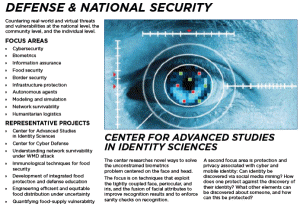Job opportunities are abundant; the White House cites estimates of the demand for cybersecurity workers growing 12 times faster than the overall job market
N.C. A&T will work with 12 other historically black colleges and universities and two national laboratories to dramatically grow the workforce of professionals, researchers and academics prepared to lead the nation’s defense against cyber attacks.
The project will be funded by the federal Cybersecurity Workforce Pipeline Consortium, a program to spark interest in cybersecurity in students from elementary school to graduate school. The $25 million, five-year program is sponsored by the U.S. Department of Energy and its National Nuclear Security

NC A&T Graphic
“The purpose of the research is to teach students the
intricacies of cybersecurity,” said
Dr. Kenneth A.
Williams, principal investigator for the project and an associate
professor of computer science. “This grant will help us teach more
students.”
Williams says student interest in the field is growing. Job opportunities
are abundant; the White House cites estimates of the demand for
cybersecurity workers growing 12 times faster than the overall job market.
Attacks like the recent hacking of Sony Pictures illustrate how high the stakes are.
“There are a tremendous number of cyberattack going on these days,” he said. “We’re teaching our students what the dangers are and how to defend against them.”
A&T’s $1.6 million from the consortium will go largely toward financial support for the students in the form of fellowships and summer internships.
Lawrence Livermore National Laboratory in Livermore, California, and Sandia National Lab in Albuquerque, New Mexico, will host the interns. Both labs have a major stake in the subject: They’re responsible for maintaining the security of the nation’s nuclear weapons.
Both labs have hosted previous A&T computer science graduate students as interns.
“We’re already heavily involved in cybersecurity,” Williams said. In addition to the graduate programs, the department offers an undergraduate concentration in information assurance. It also includes cybersecurity modules at all levels of undergraduate study.
The department conducts a high level of research in the field as well.
“We have the Center for Cyber Defense, which has been here for several years,” Williams said. “And we have the Center for Advanced Studies in Identity Sciences, which conducts research in identity science, cyber identity protection and privacy.”
The National Security Agency and the Department of Homeland Security have designated the Center for Cyber Defense as a National Center of Academic Excellence in Information Assurance Education.
In addition, the department has a research partnership with GTCC’s Cyber Crime Technology program. The collaboration allows GTCC students in that program and others to conduct independent and joint research in cybersecurity at the two A&T research centers.
The schools established the partnership in 2013 to involve GTCC students in research early in their academic careers.
Williams will be working on the new graduate-level expansion with Dr. Anna Yu, professor of computer science and director of the department’s graduate programs.
The lead institution in the consortium is Norfolk State University. A&T is the only North Carolina university involved and is one of only two historically black universities with a doctoral program in computer science
Center for Cyber Defense Department of Computer Science, College of Engineering
- Designated a National Center of Academic Excellence in Information Assurance Education by the National Security Agency and the Department of Homeland Security.
- Director: Dr. Dorothy Yuan, associate professor, Computer Science
- For an overview of computer science research at A&T, click here.
Objectives
- To provide innovative education and training programs that prepare students to become professionals and leaders in Information Assurance.
- To become a leading academic institution for research in information assurance.
Center for Academic Studies in Identity Sciences
Department of Computer Science, College of Engineering
- Seeks to provide a variety of innovate solutions to critical identity security issues.
- Provides the intelligence community with a pool of talented researchers in biometrics. It is also focused on boosting the number of African American Ph.D. and master’s students working in biometrics.
- Funders: Army Research Laboratory, National Nuclear Security Administration and the National Science Foundation.
- Director: Dr. Gerry Dozier, professor and chairman, Computer Science.
- More information: http://casis.ncat.edu/